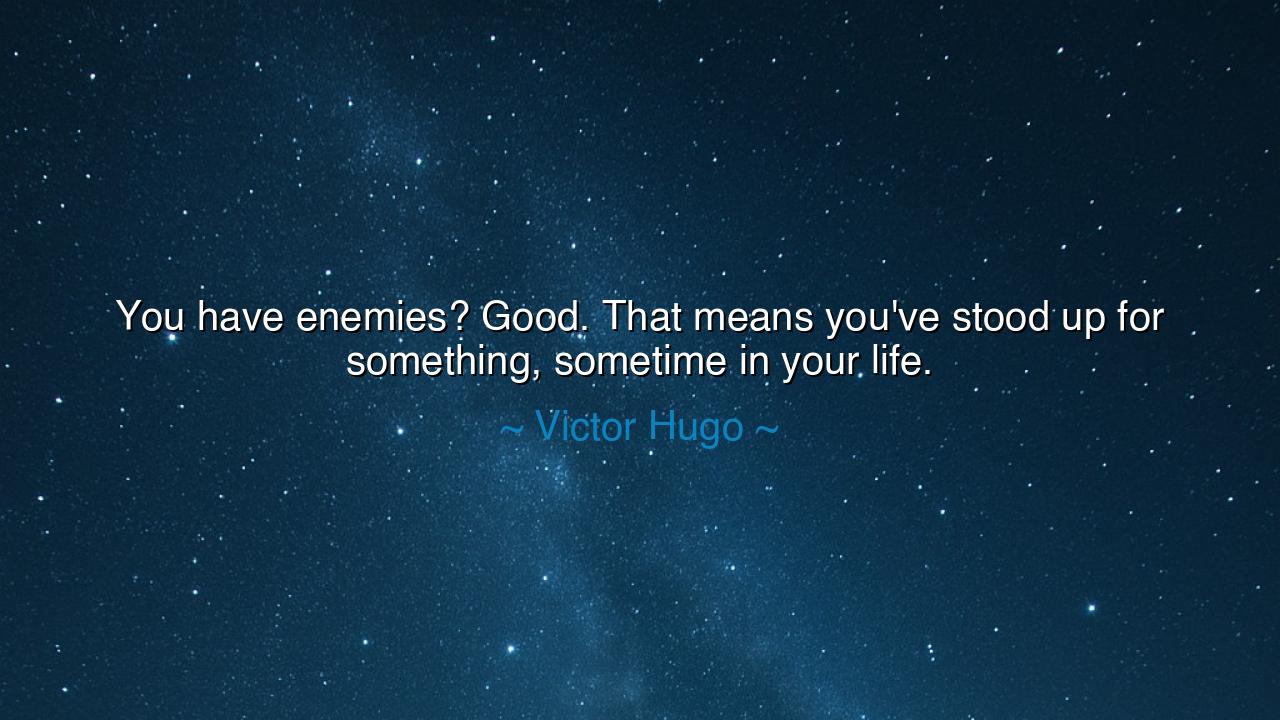
You have enemies? Good. That means you've stood up for something
You have enemies? Good. That means you've stood up for something, sometime in your life.






In the thundering voice of moral courage, Victor Hugo, the great poet and prophet of France, once declared: “You have enemies? Good. That means you’ve stood up for something, sometime in your life.” These words, carved from the stone of conviction, speak to the eternal truth that to live with integrity is to invite opposition. For only those who drift with the tide remain untouched by waves; it is the one who stands — who resists injustice, who speaks truth — that feels the storm’s fury. Hugo, who defied tyrants with his pen and gave voice to the oppressed with his art, knew well that enmity is often the shadow cast by courage.
The origin of this quote lies not only in Hugo’s writings but in his life itself. He was a man who lived through revolution and exile, who clashed with emperors and stood against the corruption of his time. When Napoleon III seized power in France, many bowed in silence — but Hugo, unwilling to betray his conscience, denounced him as a traitor to liberty. For that, he was banished for nearly two decades, cast away from his beloved homeland. Yet exile did not silence him; it purified his voice. From the rocky shores of Guernsey, he wrote Les Misérables, the immortal hymn to justice and redemption. Thus, his quote is not born of arrogance, but of experience — the wisdom of one who suffered for truth and saw that to be hated by the unjust is itself an honor.
To have enemies is not proof of evil, but of action. It means that at some point, you refused to yield to convenience or cowardice. The world often praises peace, but it forgets that peace without principle is submission. The person who stands for nothing invites no conflict — but neither do they inspire respect. Hugo’s words are a summons to the brave: to speak even when silence would be safer, to act even when fear whispers “stay still.” The enmity of the wicked is the badge of the virtuous. Those who live only to please others will die having pleased no one, least of all their own soul.
Consider the story of Socrates, the philosopher of Athens. He questioned the powerful, unmasked false wisdom, and taught the youth to think freely. For this, he was condemned to death. Yet as he drank the hemlock, he smiled — for he knew he had remained true to his mission. His enemies could destroy his body, but not his truth. Like Hugo, Socrates proved that a life without opposition is often a life without purpose. To live justly is to provoke those who profit from injustice; to think freely is to offend those who thrive on ignorance. Enemies, then, are not curses but confirmations — signs that one’s voice has reached the ears it was meant to challenge.
Hugo’s wisdom also reveals a deeper paradox: that conflict and conscience are intertwined. The light cannot exist without casting shadows; righteousness cannot exist without resistance. Every reformer, every prophet, every artist who dared to awaken humanity — from Galileo to Martin Luther King Jr., from Joan of Arc to Malala Yousafzai — has faced hostility. But they did not seek hatred; it came as the inevitable price of standing for something higher. Their courage disturbed comfort; their truth unsettled power. And thus, they remind us that to avoid making enemies is not a virtue — it is often a form of cowardice dressed in politeness.
The lesson, then, is not to seek enemies for their own sake, but to live so honestly that those who oppose truth will naturally oppose you. When you act from integrity, when you stand for justice, some will resist you — and that is as it should be. Do not fear their anger; fear instead the silence of your own heart. For the one who bends too easily becomes a reed in the wind, while the one who stands firm becomes a tree — battered by storms, but unbroken in root and purpose.
So, my children, remember this wisdom: do not crave universal approval, for it is the refuge of the timid. If your path is righteous, there will be those who scorn you — yet their hatred will be your testimony. Let your enemies sharpen your resolve, not poison your peace. For as Victor Hugo taught, enmity born of virtue is a greater honor than praise born of compromise. Live not for comfort, but for truth. Stand tall, even if alone. For the measure of a life is not the number of those who applaud it, but the strength of its convictions — and the courage to live them aloud.






AAdministratorAdministrator
Welcome, honored guests. Please leave a comment, we will respond soon